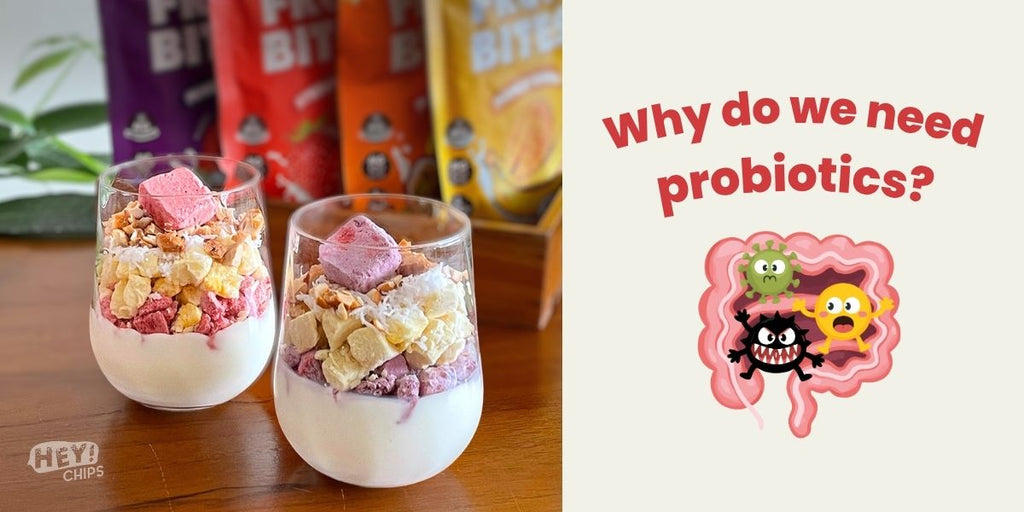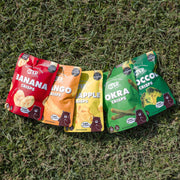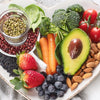Why do we need probiotics?

In recent years, probiotics have become a household name, but their importance goes far beyond trendy wellness claims. Understanding why probiotics are essential requires a closer look at the gut, the immune system, and how our bodies process food from infancy through adulthood.
The Gut-Immune Connection
Probiotics are essential for maintaining gut health, boosting immunity, and enhancing overall well-being. They have been linked to increased longevity by reducing inflammation and enhancing nutrient absorption, which are key factors in slowing the aging process.
A healthy gut is not just about digestion. Remarkably, about 70 to 80 percent of our immune cells reside in the gastrointestinal tract, interacting constantly with gut bacteria to maintain balance and defend against infections. This complex ecosystem, known as the gut microbiome, helps train immune cells to recognize harmful pathogens while supporting tolerance to beneficial microbes.

Healthy Guts are Essential for Everyone
For babies and toddlers, the development of this microbiome is critical. At birth, infants have a largely sterile gut, which gradually fills with bacteria from breast milk, formula, and other foods they are in touch with. During these formative months, introducing probiotics can help establish a healthy balance of gut bacteria, promote strong growth, better digestion and early immune development. A well-colonized gut can improve nutrient absorption, reduce digestive discomfort, and set the foundation for lifelong health.
Adults, meanwhile, can benefit from probiotics by reducing chronic inflammation, supporting immune resilience, and enhancing overall energy levels. Improved gut health is even proven to be helpful towards conditions like asthma and seasonal allergies. Even a balanced diet may not always provide sufficient live bacteria, particularly in modern lifestyles that often involve processed foods, antibiotics, and stress, all of which can disrupt the gut microbiome.
CFU Measures the Probiotic Power
Probiotic strength is measured in colony-forming units (CFU), which indicate the number of live microorganisms in a serving. While some modern supplements advertise hundreds of billions of CFU per dose, research shows that this level is often unnecessary.
For babies and toddlers, around 2 billion CFU per day is generally sufficient to support gut development. Adults typically require about 5 billion CFU per day to maintain gut health and immune function. Overloading with high CFU counts does not necessarily yield additional benefits and may be wasteful on your wallet.
Top Food Sources of Probiotics
Besides supplements, of course there are plenty of food options that are much more natural. Of which, fermented foods rank at the top in terms of the potency of probiotics.
Yoghurt: A Rich Source of Live and Active Cultures
Yogurt is one of the most accessible and popular sources of probiotics. It is rich in live and active cultures, primarily Lactobacillus and Bifidobacterium, which are beneficial bacteria that support gut health.
Kefir: A Powerful Fermented Milk Drink
Kefir, a fermented milk drink, is similar to yogurt but contains a more diverse range of probiotic strains. It is made by adding kefir grains, which contain bacteria and yeast, to milk. This results in a tangy, slightly effervescent drink that is not only rich in probiotics but also in vitamins and minerals.
Kimchi and Sauerkraut: Popular Fermented Vegetables
Fermented vegetables like kimchi and sauerkraut have gained popularity for their probiotic benefits. Kimchi, a staple in Korean cuisine, is made from fermented cabbage, and seasoned with spices. Sauerkraut, the German equivalent, is also rich in probiotics. These fermented foods increase the diversity of gut microbes, contributing to improved gut health and immunity. They are generally recommended to be eaten before the meals, giving the stomach a layer of probiotics first.
Miso and Tempeh: Fermented Soy Products
Miso and tempeh are traditional fermented soy products that are high in probiotics. Miso, a fermented soybean paste, is used in soups and sauces, while tempeh, a fermented soybean cake, is a popular dish in the South East Asian cuisines. Both products contain beneficial bacteria that support digestive health and provide essential nutrients like protein and vitamins.
Kombucha: A Trendy Fermented Tea
Kombucha is a fermented tea that has become a trendy source of probiotics. Made by fermenting sweetened tea with a symbiotic culture of bacteria and yeast, kombucha is slightly tart and effervescent. It contains various probiotics and is believed to aid digestion and boost energy levels.

Hey! Fruit Bites: A Clean, Probiotic-Rich Snack
Hey! Fruit Bites present a convenient and clean way to boost your probiotic intake. Recognizing the importance of accessible, wholesome probiotics, Hey! Fruit Bites were created to provide 4 billion CFU per pack, striking a balance suitable for babies, toddlers, kids, and adults alike.
Hey! Fruit Bites snacks combine 60% yogurt with 40% real fruit, offering a delicious and nutritious option for those with busy lifestyles. The combination of freeze-dried yogurt and fruit not only provides probiotics but also a full retention of essential vitamins and minerals, making it a well-rounded snack choice.
What sets Hey! Fruit Bites apart from conventional yoghurt melts, drops, or bites is their commitment to purity. Each piece is crafted using only fresh cut fruits and pure yoghurt. There are no emulsifiers, binders, added sugars, or concentrates, just nature’s goodness carefully preserved at sub-zero temperatures to support healthy digestion and immunity.

Whether you are looking for a baby snack, toddler snack, or probiotic snack for older children, Hey! Fruit Bites offer a convenient, safe, and tasty way to nurture the gut microbiome. They are portable, require no preparation, and can be consumed on-the-go, making them an ideal choice for those with hectic schedules. They provide all the benefits of probiotics while being enjoyable for young and mature palates alike, helping to establish good gut health from the earliest stages of life.

Investing in probiotics doesn’t have to be complicated. By choosing a snack like Hey! Fruit Bites, parents can be confident that their children and even themselves are getting the right dose of beneficial bacteria to support immunity, digestion, and overall well-being.
Daily Probiotic Intake Recommendations
For adults, a daily intake of 5-10 billion CFU is generally recommended to maintain gut health. However, this can vary based on individual health needs and dietary habits. It's important to choose a variety of probiotic sources to ensure a broad spectrum of beneficial bacteria.
Children can also benefit from probiotics, but their intake should be adjusted based on age and health status. Typically, a dose of 2-4 billion CFU per day is suitable for toddlers and children.

Adjusting Probiotic Intake Based on Individual Health Needs
Individual health needs vary, and so do probiotic requirements. Factors such as age, lifestyle, and existing health conditions (like asthma, eczema, allergies, etc) can influence the optimal probiotic intake. It's important to listen to your body and adjust your intake accordingly. Consulting a healthcare professional can provide personalized guidance.
Conclusion
Integrating probiotic-rich foods into your diet can significantly enhance your gut health, immunity, and overall wellness. By incorporating different sources of probiotic-rich foods, you will be exposing your body to different beneficial bacteria to build a stronger gut health.
Besides probiotics, consider eating clean, whole natural foods as much as possible. Try to avoid ultra-processed food or food with unrecognisable industrial ingredients to support your journey to better health. Remember: We are what we eat.












